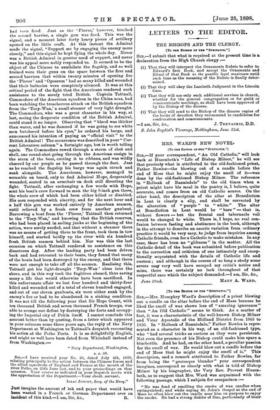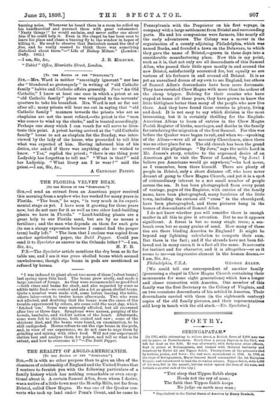MRS. WARD'S NEW NOVEL,
[TO THE EDITOR or TEE " Sl'ECTATOL1 your correspondent, " An Old Catholic," will look back at Husenbeth's " Life of Bishop Milner," he will see that precisely what is attributed to the old-fashioned priest, Father Bowles—the blowing out of a candle before the end of Mass that he might enjoy the smell of it—was- done by the old-fashioned Bishop Milner. The reference in "Helbeek of Bannisdale" to the old times when a priest might have his meal in the pantry is, I believe, quite accurate, and comes from an old Catholic source. On the other hand, the description of the altar at Benediction, in Lent is clearly a slip, and shall be corrected by the alteration of " purple " to " white." The altar at Benediction in Lent would be " bare " — that is, without flowers — but the frontal and tabernacle veil• would be changed to white. There is, I hope, no real con- fusion between fasting and abstinence in the book, although in the attempt to describe an ascetic variation from ordinary practice it would be very easy, to judge from inquiries among Catholic friends, even for a Catholic to make mistakes. In any case, there has been no "glibness" in the matter. All the Catholic detail of the book was submitted before publication• to the correction and criticism of one intimately and excep- tionally acquainted with the details of Catholic life and• custom ; and although in the course of so long a study some errors may very well have escaped my critic's notice and mine, there was certainly no lack throughout of that respectful care which the subject demanded.—I am, Sir, &o., June 22nd. MARY A. WARD.
[TO THE EDITOR or THE " SPECTATOR."]
SIR,—Mrs. Humphry Ward's description of a priest blowing- out a candle on the altar before the end of Mass because he liked the smell of was shows less of " amazing ignorance ' than " An Old Catholic " seems to think. As a matter of fact, it was a characteristic of the well-known Bishop Milner and Vicar Apostolic of the Midland District from 1803 to
1826. In " Helbeek of Bannisdale," Father Bowles is repre- sented as a character in his way, of an old-fashioned type, who " had several tricks as curious as they were persistent. Not even the presence of his Bishop could make him spare a. bluebottle. And he had, on the other hand, a peculiar passion for the smell of wax. He would blow out a candle before the end of Mass that he might enjoy the smell of it." This description, and a remark attributed to Father Bowles, far from being the "grotesque blunder" your correspondent imagines, correspond so closely with what is told of Bishop. Milner by his biographer, the Very Rev. Provost Husen- beth, as to suggest that Mrs. Ward was acquainted with the• following passage, which I subjoin for comparison :— " He was fond of smelling the smoke of wax candles when extinguished; and while saying St. John's Gospel at the end of Mass he often blew out the candle near him on purpose to enjoy the smoke. He had a strong dislike of flies, particularly of their buzzing noise. Whenever he heard them in a room he rolled up his handkerchief and pursued them with great vehemence. Nasty things ! ' he would exclaim, and never suffer one about him if he could help it. Even in the chapel he has been seen to leave his place and chase a buzzing fly to the window in hopes of killing it. He used to observe that Beelzebub meant the God of fries, and he really seemed to think there was something diabolical about them."—" Life of Bishop Milner." (London : Daffy. 1862.)
—I am, Sir, &c., J. B. MILBURN.
" Tablet " Office, Henrietta Street, London.
[To THE EDITOR OP THE " SPECTATOR."] 'SIR,—Mrs. Ward is neither "amazingly ignorant" nor has she " blundered so grotesquely " in writing of " old Catholic family " habits and Catholic affairs generally. Pace " An Old 'Catholic," I know at least one case in which a priest at an '' old Catholic family" place was relegated to the servants' quarters to take his breakfast. Mrs. Ward is not so far out after all ; many priests will bear me out in saying that "old Catholic family" manners towards the priests who act as chaplains are not the most refined,—the priest is the " man who comes to wind up the clocks," and is treated accordingly. Perhaps one story which I can vouch for will serve to illus- trate this point. A priest having arrived at the "old Catholic -family" house to act as chaplain for the Sunday, was inter. viewed by the lady of the house, who proceeded to tell him what was expected of him. Having informed him of his duties, she asked if there was anything else he wished to know. " Yes," replied the priest ; " there is one thing your Ladyship has forgotten to tell me." "What is that?" said her Ladyship. " What livery am I to wear ? " said the priest. —I am, Sir, &c.,
A CATHOLIC PRIEST.



















































 Previous page
Previous page